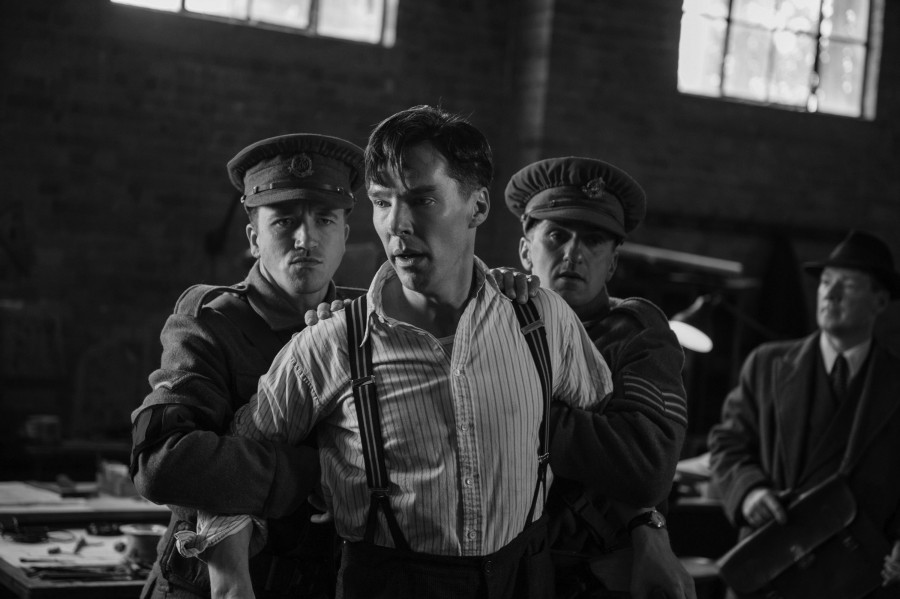Audiences impresses by biopic “The Imitation Game”
February 5, 2015
Benedict Cumberbatch stars in the captivating historical thriller, The Imitation Game, as the cryptanalyst Alan Turing, the man responsible for cracking German codes during World War II and saving approximately 14 millions lives. All in all, the movie was a beautiful representation of the difficulties behind the scenes of war and the hardships of a man struggling to come to terms with his identity.
The Imitation Game is based on the book Alan Turing: The Enimga written by Andrew Hodges. The screenplay of the film was written by Graham Moore and was directed by Morten Tyldum.
The movie plays with a nonlinear time stream first introducing Turing after the war is over where he is viewed as an unstable professor being interrogated by two detectives, played by Rory Kinnear and Tom Goodman-Hill. The timeline then jumps to several years previous, in 1939, where Turing is being interviewed for a top-secret job to break Enigma, a military machine used to encipher and decipher codes used by the Nazis in Germany. Turing is chosen to work alongside other cryptographic persons, including Hugh Alexander (Matthew Goode), John Cairncross (Allen Leech) and Peter Hilton (Matthew Beard).
The team works together everyday to break the codes before midnight, since every night they are reset and must start from scratch again. During this time period, Turing gets the idea to build a machine that will break the German codes automatically. He also meets Joan Clarke, played by Keira Knightly, a highly intelligent woman who agrees to help the mathematician work on the encoded messages.
In between working on the machine and trying to get along with his team, the movie also cut to scenes of Turing at boarding school as a child, where he was unpopular and bullied by the other kids. He eventually finds comfort in a friend named Christopher, who introduces him to cryptography, or the art of code breaking. Christopher and Alan’s relationship develops and Turing later names his beloved machine after him. Alex Lawther portrays the younger Alan Turing.
The movie as a whole is enthralling, not just from a historical standpoint but also from a physiological stance. It shows the thought process of a man who must “play God” in order to help Britain and its alliances win the war against Nazi Germany. Probably the most important scene in the entire movie is towards the end when Cumberbatch gives his beautiful “Am I a war hero? Am I a war criminal?” speech, in which he contemplates his role in the war and how it has affected other people.
The film also focuses on homosexuality and gay rights during this time period. Because being gay was illegal in Great Britain for some time, the film shows the affect that Turing’s sexuality had on his life and his career.
Benedict Cumberbatch’s acting in the film is nothing short of incredible. As pointed out in several reviews and critics, his character seems to fall somewhere on the Autistic spectrum. Throughout the movie, he seems to not fully understand social cues, and many jokes made simply go over his head. He is also cold and detached when it comes to empathizing with his fellow coworkers. Despite these qualities, Cumberbatch makes Turing likable. He has the audience rooting for him to complete his machine. He shows the vulnerability behind the character and proves that people can change and develop. For me, the most astonishing part of the film was watching Cumberbatch change from a put-together, witty man to an unstable, broken one.
Knightly’s acting is also notable in the movie. Her portrayal of Clarke not only shows her strength, but also her intelligence. She made the movie quite enjoyable to watch and even proved her talent in the movie dramatic ending. Other noteworthy performances include Matthew Goode, who plays Turing’s coworker, whose acting proves to be an important asset to the film.
The majority of the reviews have been overwhelmingly positive. Rotten Tomatoes gave the film an impressive 90 percent positive with critics saying that the movie was “well-crafted ” and “illuminating”. The New York Times was slightly less impressed, calling the film “conventional” and “stale”, rewarding the film only two and a half stars. Other critics have stated that the film’s flashback based film interrupted the flow of the movie, however I disagree wholeheartedly. I think the flashbacks were perfectly timed as to give the audience an insight on Turing’s childhood and how it affected him as an adult. Other critics have been that the movie did not show enough of Turing’s sexuality to fit the ending of the movie, which I partially agree with.
As a whole, I think that the movie was beautifully executed and proved to be an educational movie about a man who has not been credited enough for his work. The theme of the movie can mostly be described as a line repeated several times in the movie: “Sometimes it is the people no one imagines anything of who do the things that no one can imagine.”

















